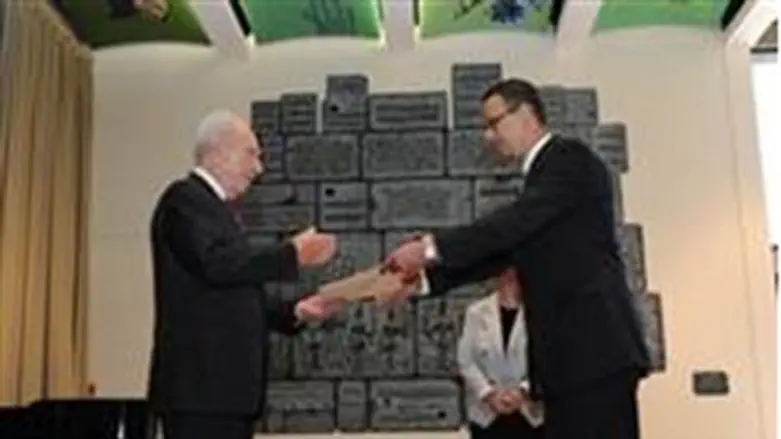
Egypt's new Ambassador to Israel Atef Salem confirmed Wednesday to President Shimon Peres that Cairo intends to keep its peace treaty with Israel.
In a conversation at the presidential residence in Jerusalem, Salem made the point clear upon presenting his credentials to Israel's elder statesman just prior to Jordan's new Ambassador, Walid Obeidat. The Jordanian envoy's meeting carried an entirely different significance due to domestic conflict over the country's relationship with Israel.
Egyptian President Mohammed Morsi wrote in Salem's letter of credence, “Great and good friend, being desirous of maintaining and strengthening the cordial relations which so happily exist between our two countries, I have selected Mr. Atef Mohamed Salem Sayed El Ahl to be our ambassador extraordinary and plenipotentiary.”
The letter ended with standard diplomatic greetings expressing “highest esteem and consideration” for Israel's president. The new Egyptian envoy was likewise received by Peres as the representative of the “leading country of the Arab world.”
The president underscored the essential nature of the peace that has existed between Israel and Egypt since 1979, which he said “saves the lives of tens of thousands of young people in Egypt, the Middle East and Israel. I know it's not simple, I know there are people who try to frustrate peace,” he told the envoy. “I really believe that both our governments will do whatever can be done to keep it deep, sincere, strong and serious for the sake of your people, for the sake of ours.”
Peres added his hope to “introduce a tone of friendship instead of suspicion” to the relations between the two nations, saying he believed that Salem would find in Israel “many friends.”
The Egyptian envoy, a career diplomat who has previously served as consul-general in Eilat, agreed and said his government had a similar vision, and is “thinking the same way,” with plans for a new constitution that would preserve the idea of a “moderate and civilian” state.
Egypt's president has repeatedly said he would continue to maintain the peace with Israel and uphold international documents signed by prior Cairo administrations, despite opposition from his Muslim Brotherhood backers, who have called for a jihad (holy war) to "liberate" Jerusalem.
In Jordan, King Abdullah II is struggling to maintain a “moderate and civilian” atmosphere with increasing protests by the opposition Muslim Brotherhood ramping up the tension. The Islamist organization has been doing its best to stir up anger against the Hashemite monarch on a variety of levels, including his decision to send an envoy to Israel.
Obeidat, a member of a Bedouin tribe, himself received personal flack for deciding to accept the position as well.
"He who accepts this post will have crossed all red lines and seriously harms members of his tribe, who thereby dissociate from him,” wrote members of his tribe in a statement released to media. “This tribe was and will remain loyal to its nation and will refuse to reconcile with its enemies, in order to liberate all Palestinian land.”